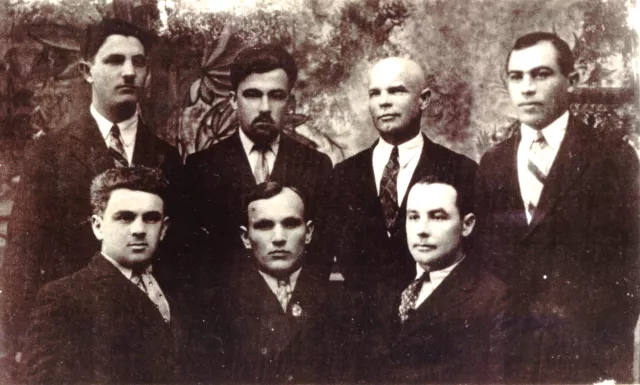Israel Gliazer’s brother Moishe Gliazer with Political prisoners
These are political prisoners released from a prison in Drogobych in 1934. They are representatives of various political parties. In the upper row from left to right: the first is my brother Moishe, member of the Communist party, next to him are Shveikov, Aleksyuk, Rozenfeld. In the lower row first from left is Erdlei, in the center a member of the Communist Party of Poland, the one on the right is a member of the Ukrainian Nationalistic Party, brother of Stepan Bandera, leader of Ukrainian nationalists, whose name I don't remember.
My older brother Moishe didn't continue his studies after the cheder since he had to start helping our parents to support the family. Moishe finished an accounting course and worked in our father's store. There were no other employees working for my father.
There was some confusion in our family at that period. The situation in the country was uncertain as well. There was a number of Zionist organizations in Poland and there was also a socialist and a communist party in Poland.
In the 1930s my older brothers Moishe and Velvel became fond of communist ideas and joined the Communist Party of Western Ukraine, forbidden in Poland [the Communist Party of Western Ukraine, formed in Lvov in 1920s spread its activities to the areas populated by Ukrainians in Poland. Their goal was reunification of the Ukrainian people, unification of Ukraine and annexation of the Western Ukrainian territories to the USSR. This Party merged with the Communist Party of the USSR in 1939. Many of its activists were arrested]. My father was trying to convince his sons to resume their faith and turn to Hasidism that was more important than any political tendencies to my father. He even consulted the rabbi about his disobedient sons. However, Velvel and Moishe didn't listen to our father. Velvel printed illegal communist flyers in the printing house that they spread. Velvel and Moishe were arrested and imprisoned in a political prison in Drogobych. In 1934 Moishe was granted amnesty, but Velvel had to sere his longer sentence. We have a photo where Moishe was photographed with other political prisoners released from the prison in Drogobych. Were representatives of different parties even hostile to one another in this photo: communist party of Western Ukraine, socialist party and even Ukrainian Nationalistic Party - there is a brother of Stepan Bandera, Ukrainian national patriot, communist party of Poland. At present Bandera is an acknowledged national hero and patriot of Ukraine. He lived in Drogobych. This area belonged to Poland before 1939. Bandera struggled for the independence of Ukraine and reunification of the Ukrainian people.
The Soviet power came to Pogdaytsy in 1939. They nationalized small stores and shops, including my father’s store. My father managed to take home the remaining goods, tools and materials. He sold out the goods and continued to take orders from clients at home. Moishe assisted him as before. He married Rivke, a Jewish girl, in 1937. Since Moishe was a member of the Communist party he didn’t want a Jewish wedding, but our father and his fiancee’s parents insisted and they had a traditional Jewish wedding with a chuppah at the synagogue. In 1938 their son was born. Velvel was also married. I don’t remember the names of his wife, daughter or son. When the soviet power was established Velvel became chief of the military commissariat in Pogdaytsy.
I didn’t have any information about my family during the World War II. I heard the horrific truth only in 1946 - my family perished. My parents and sister moved to Skalat at the beginning of occupation. They were in the ghetto in Skalat with my mother’s sisters and they all perished when fascists eliminated the ghetto in the end. My brother Velvel’s family perished in Pogdaytsy. Velvel perished at the front in 1944. Only Moishe, my older brother, who was in the Soviet army survived. Moishe was wounded at the beginning of the war. He had to take medical treatment in a hospital and after the hospital he worked at a plant in Sverdlovsk. He found his wife Rivka in Ural, where she was in evacuation. Their son had died in a train during their trip. There was a short period after the war when residents of western regions were allowed to move to Poland. Moishe and Rivka moved to Wroclaw and then to Warsaw in Poland. I visited them several times in the 1950s. Moishe worked in the Polish Ministry of Finance, he was a clerk, but I am not sure about this. Moishe was an invalid of the war. He was severely ill and died in the late 1960s. His son lives in Stockholm, Sweden.













